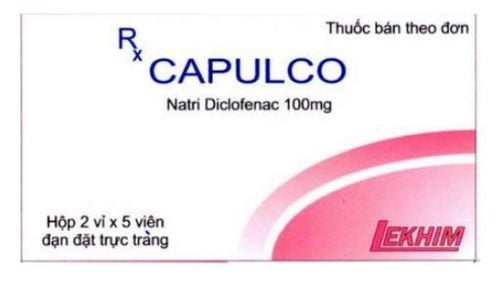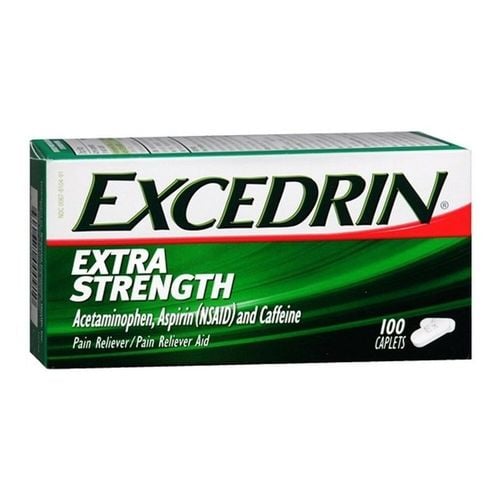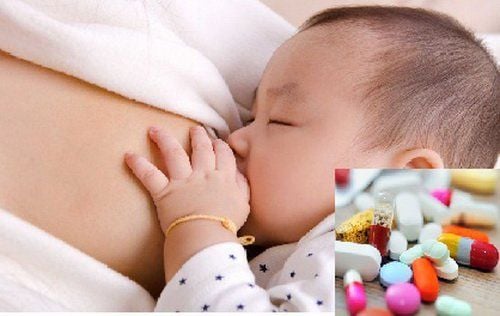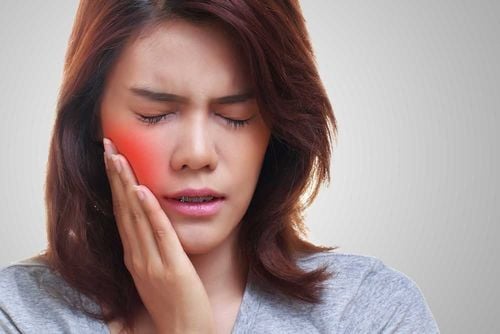This is an automatically translated article.
Najen belongs to the group of pain relievers, antipyretics, non-steroid anti-inflammatory drugs, drugs to treat gout and bone and joint diseases, has the effect of reducing pain, anti-inflammatory with osteoarthritis, rheumatoid arthritis, burn inflammation. low life. Najen is a prescription drug, which patients can only use under the guidance of a doctor.1. What is Najen?
Najen medicine has the main active ingredient Aceclofenac 100mg and other excipients such as Lactose monohydrate, titanium dioxide, PEG 4000, povidone, polysorbate 80, microcrystalline cellulose M112, silicon dioxide, magnesium stearate. The drug is prepared in the form of film-coated tablets, round tablets, white film-coated tablets, one side smooth, the other side stamped with dashes, packed in boxes of 3 blisters x 10 tablets or boxes of 10 blisters x 10 tablets.
2. What effect does Najen have?
Mechanism of action of the drug: the active ingredient Aceclofenac has the ability to inhibit, prevent the production of hormone-like substances called prostaglandins - mediators of the inflammatory process that make patients feel pain. The patient's pain is reduced.
2.1. Uses - indications for Najen Najen is used in the following cases:
People with osteoarthritis: Damaged tissues and bones in the joints. Especially people over 50 years old often experience this disease, causing pain and affecting daily activities. People with rheumatoid arthritis. People with ankylosing spondylitis: The joints stick together. In addition, it is also treated for other diseases such as toothache, back pain, injury,... 2.2. Contraindications to using Najen Najen drug is contraindicated for use in the following cases:
People who are allergic or sensitive to the active ingredient Aceclofenac or any of its ingredients. People with a history of allergy to non-steroidal anti-inflammatory drugs. People who cannot use NSAIDs or aspirin. Symptoms include: Asthma attacks that cause tightness in the chest, shortness of breath and wheezing, runny nose, sneezing and itching, red patches on the skin, itching, stinging or burning. People with kidney failure. People who have had, are suffering from, or are suspected of having peptic ulcer disease, are vomiting blood or having bloody stools (black stools). People with heart disease or cerebrovascular disease, people who are having problems with blood circulation or have clotting disorders, bleeding disorders. Najen should not be used by women who are pregnant. If you must use it, consult your doctor and strictly adhere to the prescribed dose.
3. How to use and dose Najen
How to use: Najen is prepared in the form of film-coated tablets should be taken directly orally, with a sufficient amount of water. Avoid taking the drug with other liquids such as alcohol, carbonated drinks, soft drinks, do not crush or break the tablet, which affects the active ingredients in the medicine. Patients can take the drug during or after meals to minimize the risk of affecting the stomach and intestines.
Dosage:
For adults: Use the recommended dose of 100mg / 2 times / day. It is possible to change the dose and the number of times of taking the drug according to the instructions of the doctor, depending on the specific condition and condition of the patient. For children: There are no clinical studies on the use of Najen in children. In case of missed dose: Patients can take it as soon as they remember, however, if it is too close to the time for the next dose of Najen, skip the missed dose and take the dose according to the indicated schedule. Note, do not take twice as many doses to make up for the missed dose, to avoid overdose.
In case of overdose: There are currently no reports of symptoms when using the drug overdose.
4. Najen . side effects
Like other drugs, in addition to the main use that Najen brings, patients may also experience some unwanted side effects such as:
Rare symptoms:
Severe allergic reactions: Fever, difficulty breathing, wheezing, abdominal pain, nausea, vomiting, facial edema. These symptoms develop very quickly and can lead to death. Symptoms of severe skin rash: Stevens-Johnson syndrome, toxic epidermal necrolysis. These symptoms develop rapidly into large blistering and peeling patches and can also lead to death. Causes meningitis, high fever, headache, red rash, stiff neck, sensitivity to light. Causes kidney failure. Causes abdominal pain, indigestion, heartburn or other unusual stomach symptoms. Blood disorders: Decreased ability to produce blood cells, hemolytic anemia, reduced iron content in the blood, decreased platelets, white blood cells, irritation of blood vessels causing vasculitis. Body fatigue, joint pain, bruises, easy to get infections many times. Common symptoms:
Causes dizziness, nausea, diarrhea, increased levels of liver enzymes in the blood Uncommon symptoms:
Flatulence. Irritation or inflammation of the stomach lining. Causes constipation, mouth ulcers, vomiting, itching, rash. Dermatitis, the appearance of red itchy patches, burns on the skin, nodules like insect stings. Increase the amount of urea, creatinine in the blood. Very rare cases:
Difficulty sleeping, abnormal dreams, drowsiness, headache, ringing in the ears, abnormal taste, stomatitis, shortness of breath, stridor, feeling dizzy when standing up Discomfort skin, tingling, pancreatitis, perforation of the stomach, intestines or large intestine wall, liver and kidney damage, fluid retention and edema. Cases of unknown frequency:
Hallucinations, confusion, blurred vision, partial or complete loss of vision, pain when moving eyes. Causes bronchial asthma. Risk of cardiovascular thrombosis.
5. Najen drug interactions
Before using the drug, the patient needs to inform the doctor, pharmacist about all the drugs, functional foods, vitamins, herbal medicines that they are using to minimize the unfortunate interactions. happen. Some medicines need the following notice:
Drugs for mental problems: Citalopram, Escitalopram, Fluvoxamine, Fluoxetine, Paroxetine and Sertraline or Lithium. Medicines used to treat the heart such as heart failure, irregular heartbeat: Digoxin, cardiac glycosides. Medicines used to treat high blood pressure: Lisinopril, Enalapril. Antagonists: Losartan, Candesartan, Methyldopa, Clonidine, Hydralazine, Moxonidin, Propranolol. Medicines to treat infections: Ciprofloxacin, Ofloxacin, Levofloxacin, Moxifloxacin. Diuretics: Thiazides, Amiloride, Furosemide, Hydrochlorothiazide. Anticoagulants: Heparin, Warfarin. Medicines used to treat swelling, inflammation, steroids: Hydrocortisone, Prednisone. Medicines to treat HIV, drugs to suppress immunity after organ transplantation.
6. Some notes when using Najen
When using Najen, users need to be careful with the following notes:
Inform the doctor if the user has the following health problems because the drug can make them worse: Stomach disorder , chronic enteritis, gastric ulcer or perforation. Have asthma or other breathing problems. Having angina pectoris, high blood pressure, increased cholesterol, increased body fat. If you have chickenpox, this medicine should be avoided because it can cause a serious skin infection. Use the lowest dose for the shortest time if the user is elderly. Najen should be discontinued at the first appearance of symptoms such as: shortness of breath, fever, skin rash, tightness in the chest,... If the user is a pregnant woman or intends to become pregnant, it is necessary to consult Consult your doctor before using Najen because it can make it difficult to get pregnant. It is not recommended to use the drug for women who are breastfeeding because there is no safety recommendation for this subject. Use caution when driving, driving, or operating machinery because it can cause drowsiness, dizziness, lightheadedness, fatigue, or vision problems. Hopefully, the information shared about Najen above will help users gain more useful knowledge, equip themselves with good situational handling skills when problems occur during use. Note, Najen is a prescription drug, patients need to use the drug as prescribed by the doctor, absolutely do not self-treat at home.













